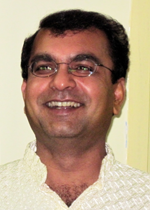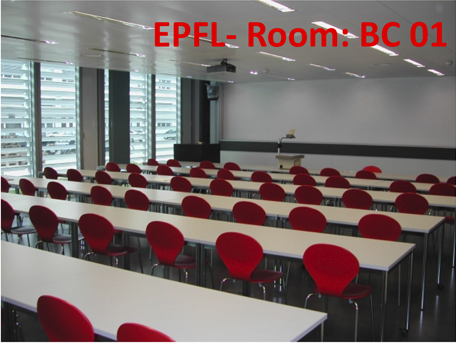Go to
Vivek De
 Intel Fellow and Director of Circuit Technology Research
Intel Fellow and Director of Circuit Technology Research
Intel Labs
Hillsboro, Oregon, USA
Energy Efficient Designs with Wide Dynamic Range
Aggressive voltage scaling is a must for making major leaps in energy efficiency and power-constrained performance of microprocessors special-purpose engines. We need to span a very wide range of performance and power across a large number of diverse computing engines and workloads with the fewest distinct designs. This requires our designs to achieve near-threshold-voltage (NTV) operation while supporting a wide voltage-frequency operating range with minimal impact on die cost. Breaking the 0.5V voltage barrier for designs in high-volume manufacturing (HVM) at scaled process technology nodes has been a major challenge. We will discuss circuit and design technologies that can be combined with improvements in process and manufacturing technologies, to overcome the challenges posed by device parameter variations, supply noises, temperature excursions, aging-induced degradations, workload and activity changes, and reliability considerations. The four major pillars of energy-efficient designs with wide dynamic range are: (1) circuit/design optimizations for fine-grain multi-voltage & wide dynamic range, (2) fine-grain on-die power delivery & management, (3) dynamic adaptation & reconfiguration, and (4) dynamic on-die error detection & correction. Circuit/design optimizations must carefully balance voltage scalability with die area and maximum performance using intelligent metrics and methodologies. Furthermore, in many-core throughput engines, fine-grain multi-voltage/frequency capabilities can alleviate impacts of within-die variations on overall performance and energy-efficiency. Fine-grain on-die power delivery & management techniques enable efficient, distributed multi-voltage domains depending on circuit types and activity profiles. Then the threshold and supply voltages can be scaled more aggressively with minimal impact on leakage power. Also, the average operating voltage of the design can be reduced more dramatically since a few outlier circuits or transistors will no longer limit the voltage scaling of the majority of the design. Dynamic voltage-frequency adaptation helps reduce guardbands over the entire operating range resulting from worst-case assumptions about supply noises, temperature variations and aging. When combined with reconfigurations to bypass early-life or transient failures in circuits, and with error detection, profiling and correction, dynamic adaptation and resiliency can help push voltage/frequency limits much more aggressively than is possible using traditional means. Silicon learnings for some of these technologies from proof-of-concept testchips and research prototypes will be presented.
About the speaker:
Dr. Vivek De is an Intel Fellow in Intel Labs, and Director of Circuit Technology Research. Currently he serves as the Director of the Circuits Research Lab in Hillsboro, Oregon, USA where he is responsible for providing strategic technical directions for long term research in future circuit technologies. He has 199 publications in refereed international conferences and journals, and 176 patents, with 28 more patents filed (pending). He is a Fellow of the IEEE.
Secondary navigation
- EPFL Workshop on Logic Synthesis and Emerging Technologies
- Luca Amaru
- Luca Benini
- Giovanni De Micheli
- Srini Devadas
- Antun Domic
- Rolf Drechsler
- Pierre-Emmanuel Gaillardon
- Jie-Hong Roland Jiang
- Akash Kumar
- Shahar Kvatinsky
- Yusuf Leblebici
- Shin-ichi Minato
- Alan Mishchenko
- Vijaykrishnan Narayanan
- Ian O'Connor
- Andre Inacio Reis
- Martin Roetteler
- Julien Ryckaert
- Mathias Soeken
- Christof Teuscher
- Zhiru Zhang
- Symposium on Emerging Trends in Computing
- Layout synthesis: A golden DA topic
- EPFL Workshop on Logic Synthesis & Verification
- Luca Amaru
- Luca Benini
- Robert Brayton
- Maciej Ciesielski
- Valentina Ciriani
- Jovanka Ciric-Vujkovic
- Jason Cong
- Jordi Cortadella
- Giovanni De Micheli
- Antun Domic
- Rolf Drechsler
- Henri Fraisse
- Paolo Ienne
- Viktor Kuncak
- Enrico Macii
- Igor Markov
- Steven M. Nowick
- Tsutomu Sasao
- Alena Simalatsar
- Leon Stok
- Dirk Stroobandt
- Tiziano Villa
- Symposium on Emerging Trends in Electronics
- Raul Camposano
- Anantha Chandrakasan
- Jo De Boeck
- Gerhard Fettweis
- Steve Furber
- Philippe Magarshack
- Takayasu Sakurai
- Alberto Sangiovanni-Vincentelli
- Ken Shepard
- VENUE
- Panel on Circuits in Emerging Nanotechnologies
- Panel on Emerging Methods of Computing
- Panel on The Role of Universities in the Emerging ICT World
- Panel on Design Challenges Ahead
- Panel on Alternative Use of Silicon
- Nano-Bio Technologies for Lab-on-Chip
- Functionality-Enhanced Devices Workshop
- More Moore: Designing Ultra-Complex System-on-Chips
- Design Technologies for a New Era
- Nanotechnology for Health
- Secure Systems Design
- Surface Treatments and Biochip Sensors
- Security/Privacy of IMDs
- Nanosystem Design and Variability
- Past Events Archive
Registration
Please note that paid registration is required for all participants of the workshop.
The full registration fee of 1200 € includes:
- Attendance to all lectures
- Printed and soft copy lecture notes
- Daily lunch with instructors
- All coffee breaks
- One social event (gala dinner)
Please click HERE to fill the online registration form.
Members of EPFL/ETHZ are offered a reduced rate for registration. EPFL/ETHZ members please click HERE to register.
For further information, you may contact Ms. Melinda Mischler by fax (+41 21 693 69 59) or e-mail (melinda.mischler@epfl.ch).


